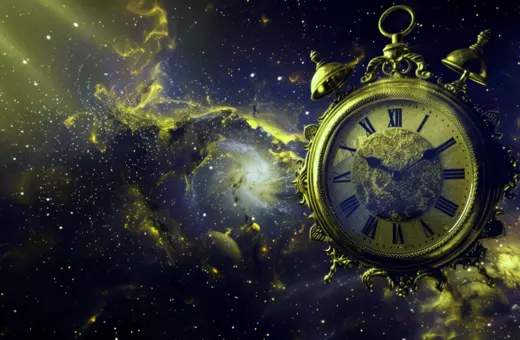It is often argued that the physics of time contradicts our experience. In response to Avshalom Elitzur, Matt Farr challenges this view by claiming that we need not fear that modern physics gets anything wrong about our subjective experience of time.
Avshalom Elitzur will be speaking at the upcoming HowThelightGetsIn Festival in London, September 23rd/24th 2023 alongside Michio Kaku, Tim Maudlin, and Jimena Canales. Check out the incredible line-up of speakers and festival programme here.
Does time flow? Do we experience it as flowing? And does physics suggest that, ‘really’, time does not flow? In his recent essay for IAI News, Avshalom Elitzur notes that physics treats the flow of time as unreal and illusory, and suggests that his own ‘spacetime dynamics’ theory offers a way back for the reality of time flow. But I think there’s a simpler way forward.
The idea that physics contradicts our experience of time is certainly common. A century ago, Cambridge astronomer Arthur Eddington expressed his own frustration with the conflicting views of time he took from fundamental physics on the one hand, and our ‘experience of growth and becoming’ on the other. Physics, it seemed, implied that our everyday view of time is illusory. The fundamental laws of physics with which Eddington was acquainted contain no arrow of time; effectively, any process that could happen from past to future could also ‘happen’ from future to past. This clashed so much with our apparent experience of time that Eddington ultimately showed sympathy for a strikingly unscientific point of view, that “consciousness, looking out through a private door, can learn by direct insight an underlying character of the world which physical measurements do not betray.” Put like that, the position is distinctly unattractive, which was ultimately Eddington’s point. We are apparently stuck between two ‘pictures’ of time: either time is ‘really’ dynamic (it flows, it passes), as experience suggests; or it is ‘really’ static, as physics suggests.
So what is this special quality of time that is allegedly left out by physics? Is it something that we actually experience? And does our experience therefore provide evidence that our physical understanding of time is seriously incomplete?
___
The ‘static’ picture we get from physics, I suggest, is perfectly rich enough to fit with the various special ways in which we experience and interact with time.
___
My aim here is to show that the situation is not as bleak as Elitzur suggested in his recent article for IAI News. Elitzur describes how physics ‘ignores’, ‘eliminates’, ‘dismisses’ key features of time, and requires a new approach in which things like the ‘Now’ and its motion are enshrined in fundamental physics. However, despite the age of this particular debate, it remains unclear what specific temporal properties are left out by fundamental physics, and what features of the physical world such properties would help to explain. On the contrary, the ways in which physics allegedly contradicts our intuitive picture of dynamic time are often significantly overplayed; in particular, it is misleading to suggest that we experience time as dynamic in a way that contradicts the picture of time we get from physics. The ‘static’ picture we get from physics, I suggest, is perfectly rich enough to fit with the various special ways in which we experience and interact with time.





















Join the conversation